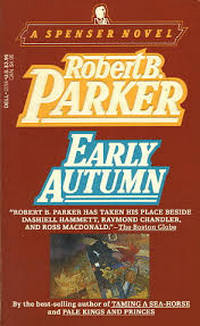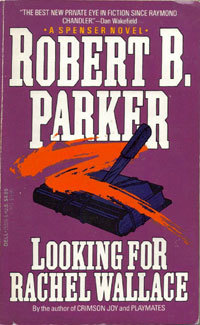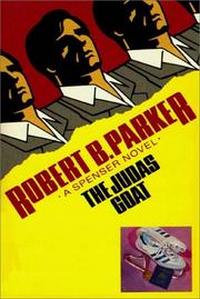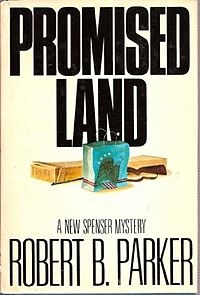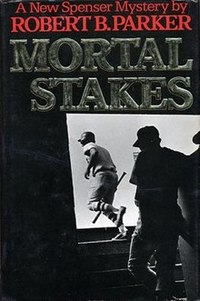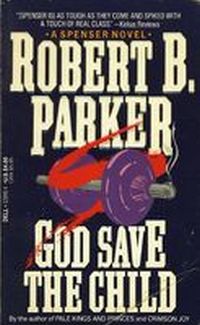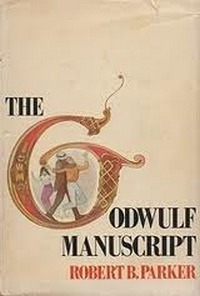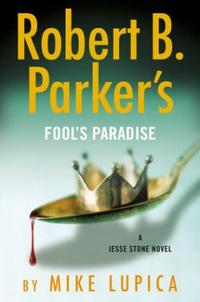 |
Robert B. Parker’s Fool’s Paradiseby Mike Lupica eARC, 352 pg. Read: September 2-3, 2020 |

What’s Fool’s Paradise About?
Suitcase Simpson calls Jesse to the scene of a murder, an unidentified man has been found shot at the lakeshore. Jesse recognizes the man—they’d been at the same AA meeting the previous night. It’s not Jesse’s regular meeting, and he didn’t think this man was a regular, either. But at least they had a first name to go off of.
Suit is able to find out at least a little about what the man did after the meeting. He’d taken a taxi from the neighboring town into Paradise. He even had an address—the mansion of a rich and influential family who’d been in Paradise for ages. They’re quick to claim they didn’t know the man, or that he’d been at the house in the hours before he was shot. No member of PPD believes this, but there’s little they can do until they learn a bit more about the victim.
Jesse admits this isn’t entirely rational—but doesn’t back off from it—the fact that he and the victim came to the same meeting, both needing the help that can be found there, created a link for between the two of them. Jesse felt like he owed this man justice more than he would another victim (not that Jesse’s ever been known to not try to find justice for anyone, it’s just personal this time). I loved this little touch—it felt very true to the character and his circumstances, but something that a lot of authors wouldn’t do.
Not long after this, someone takes a shot at Jesse while he’s in his home. Soon, other members of the PPD are attacked off-duty. As always, Jesse, Molly, and Suit acknowledge that coincidences exist, but they have a hard time believing in them. So while they try to identify the murder victim and figure out what he’s going in Paradise (and that part of Paradise in particular), they also need to figure out why someone would be attacking the PPD. And are the two cases related?
A Nice Little Bonus
There’s a lot of Molly in this book. She gets whole chapters without Jesse in them, and a lot of space on her own in chapters with him. We get a little bit of an off-the-job look at Molly, as well as seeing her work part of the investigation. Yes, Jesse’s the central character and should be the focus—but any time that Lupica (or whoever) can flesh out Molly, Suitcase, or any of the others is time well spent (I like the new deputy, too—he was a nice touch). But Molly’s been a favorite since Night Passage introduced this world, and she’s rarely been used as well as the character should’ve been. It’s so nice to see that.
Lupica’s Take on Jesse Stone
I was worried about Lupica being given the reins of this series. I was such a fan of what Colman had done, saving the series from the Michael Brandman debacle—and even from some of the uneven quality that Parker had given toward the end.
But Lupica did exactly what he needed to do—and exactly what I’d hoped (and didn’t expect). He embraced the developments that Coleman introduced and built on them. He could’ve ignored them, or written around them, but he kept Jesse going to AA, he worked on the new relationship with Cole, and Paradise and the Paradise Police Department the same way Coleman had, treating that bit of the series with as much respect and influence as the first nine novels.
Stylistically, Lupica’s closer to Parker than Coleman—which makes sense, it’s the more natural way for him to write (and will likely win back some of Coleman’s detractors). It works for the series, it works for the author—all in all, it’s a good move.
I freely admit that I was skeptical and pessimistic about anyone but Coleman at the post-Parker helm of Jesse Stone and am glad to be proven wrong.
Something I was Pleasantly Surprised By
While I have thought in the past that the best use of Sunny Randall was when Parker used her in the Jesse Stone novels, I wasn’t thrilled to see her in these pages—I thought that Stone, at least, had grown past this relationship. It’s not what it was back in the 3-4 books that Parker wrote with them as a couple, but reflects where they both are now.
I’ve got to say, I liked her here. I liked her in Paradise more than I liked her in the two books that Lupica has written about Sunny. If he keeps this up, I won’t complain.
Lupica’s War on my Sanity
Sure, that’s hyperbolic. But it felt like he was doing this to just bug me.
The mansion that the taxi pulled up to that fateful night is owned by the Cain family, Whit and Lilly Cain. Whit suffered a stroke a few months back, so his wife, Lilly, is who Jesse primarily interacts with. She’s brash, confident, loud, and flirtatious.
Now, I’ve watched the Veronica Mars series more times than I should have. Season One more than the rest. Every time I read “Lilly Cain,” I couldn’t think about anything other than “Lily Kane,” Veronica’s brash, confident, loud, and flirtatious friend.
I know it’s a coincidence, that neither name is all that rare. But it didn’t feel that way.
So, what did I think about Fool’s Paradise?
I liked this so much more than I expected to. I went into this hoping I wouldn’t hate it, and it didn’t take long at all for me to realize I was enjoying it. The prose crackled and moved quickly. There was enough of Jesse’s quiet humor to keep me grinning. The relationships and banter between the characters was spot on. The cases were compelling, interestingly framed, and well-executed. Lupica tied his novel into the overall history of the series well (referencing over half of the books, I think) and established that he’s the right man for the job. I strongly recommend this—either for new readers or established fans. Robert B. Parker’s Fool’s Paradise is a satisfying read that’ll get you eager to see what comes next.
Disclaimer: I received this eARC from PENGUIN GROUP Putnam via NetGalley in exchange for this post—thanks to both for this.

This post contains an affiliate link. If you purchase from it, I will get a small commission at no additional cost to you. As always, opinions are my own.
![]()



